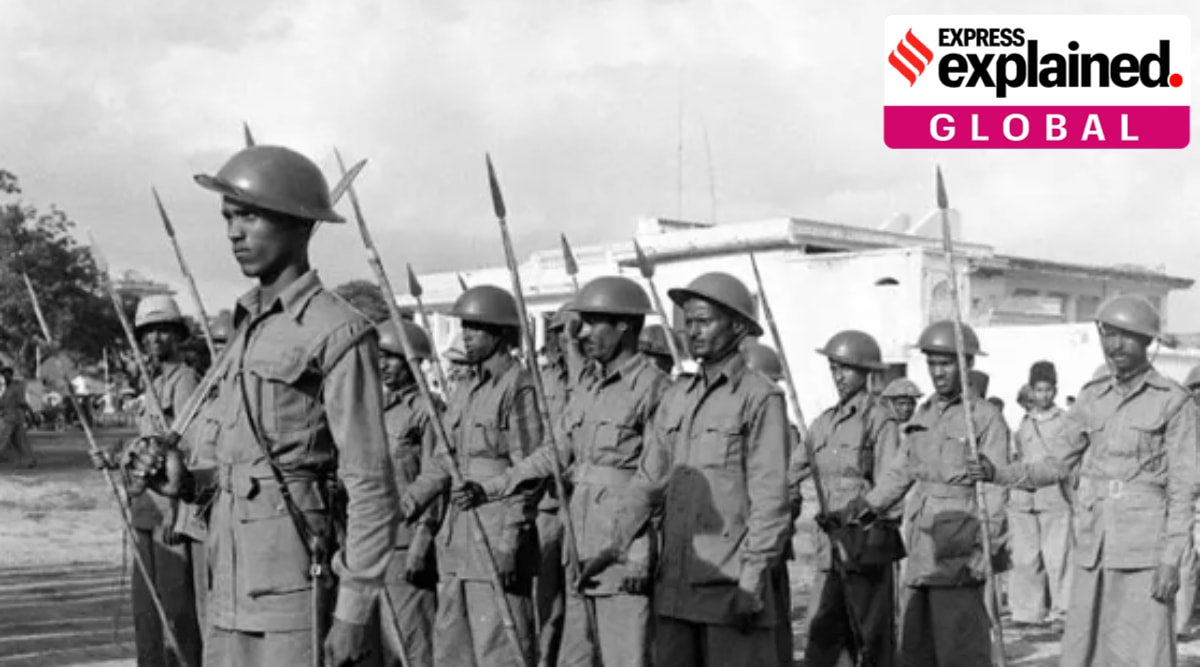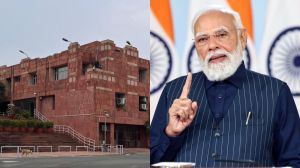Explained: Who were the Razakars, accused of horrific crimes during the 1971 Bangladesh Liberation war?
Razakar means ‘volunteer’ or ‘helper’ in Persian and Urdu, but has come to mean ‘collaborator’ and is associated with betrayal in Bangladesh.
 The Razakars were an auxiliary force of the Pakistan army during the 1971 Bangladesh War. (File)
The Razakars were an auxiliary force of the Pakistan army during the 1971 Bangladesh War. (File)Six members of ‘Razakar Bahini’, a locally recruited paramilitary force that collaborated with the Pakistan army during the 1971 Bangladesh Liberation War, were sentenced to death for ‘crimes against humanity’ by Bangladesh’s International Crimes Tribunal on Thursday (July 28).
Hailing from the country’s south-western Khulna district, the six given death penalty are A Amjad Hossain Howladar, Sahar Ali Sardar, Atiyar Rahman, Motachim Billah, Kamal Uddin Goldar, and Nazrul Islam, who is currently on the run. The three-member tribunal headed by Justice Mohammad Shahinur Islam found them guilty of ‘crimes against humanity,’ including mass killings, torture and arson.
In 2010, almost 40 years after its violent struggle for independence from Pakistan, Bangladesh established its International Crimes Tribunal in order to administer justice to those accused of committing war crimes against its people.
Who were the Razakars?
The Razakars were an auxiliary force of the Pakistan army during the 1971 Bangladesh War. Composed of mostly pro-Pakistani Bengalis and Biharis from Bangladesh (formerly East Pakistan), the approximate 50,000 Razakars assisted the army in raids against the local population and were accused of committing horrific atrocities.
Razakar literally means ‘volunteer’ or ‘helper’ in Persian and Urdu, but has come to mean ‘collaborator’ and is associated with betrayal in Bangladesh. According to the anthropologist Nayanika Mookherjee, it is used as an abuse.
Razakars mostly consisted of Urdu-speaking Bihari Muslims and religious parties that opposed the separation of East and West Pakistan, like Jamaat-e-Islami, Al Badr and Al Shams. Ethnic Bihars who had moved to Bangladesh after the partition in 1947 were in particular denounced as foreigners and collaborators by other locals, as argued by Mookherjee in her 2015 book, The Spectral Wound: Sexual Violence, Public Memories, and the Bangladesh War of 1971.
The nationalist struggle in Bangladesh was brutally suppressed by the Pakistani army and the allied Razakars, with a death toll being pegged at anywhere from 300,000 to 3 million civilians, rape of 100,000 to 400,000 women and 25,000 to 195,000 forced pregnancies. The exact figures, however, are not fully known and continue to be a subject of debate.
Fate after the Liberation War
After Bangladesh achieved independence in December 1971, the newly formed government very quickly banned organisations that collaborated with Pakistani state forces, such as the Jamaat-e-Islami, and many of its influential leaders escaped to Pakistan.
The Bangladesh Collaborators (Special Tribunals) Order was passed in 1972 and in the following year, the Sheikh Mujibur Rahman’s government introduced the International Crimes (Tribunal) Act in 1973, to investigate and prosecute those that committed atrocities during the war.
Mookherjee notes that 37,000 collaborators were identified, but around 26,000 were granted general amnesty in November 1973 by the government, while the remaining were sentenced to different terms of punishment or remained on trial.
Political rehabilitation
After Mujibur Rahman was assassinated in a coup by sections of the Bangladesh army in August 1975 and the ruling Awami League was ousted from power, the generals that took over allowed Jamaat-e-Islami , the Muslim League other Islamic parties that had fled the country to return, and over time many of the alleged war criminals gained important positions in the government.
During the period of military rule between 1975 to 1990, General Ziaur Rehman (1975–81) became the de facto head of the state. Zia repealed the Collaborator’s Act, released the remaining people who were in prison due to war crimes and facilitated the return of Shah Azizur Rahman and Ghulam Azam, controversial high-profile figures who had opposed the Bangladesh nationalist movement and had earlier been accused of being traitors.
After becoming President of the country in 1977, Ziaur Rahman invited Shah Azizur Rahman to join his newly formed Bangladesh Nationalist Party (BNP), and made him the minister of labour and industry. He was later appointed as the Prime Minister of Bangladesh by Ziaur in April 1979.
The Jamaat-e-Islami, which had allegedly aided the atrocities against Bangladeshi nationalists in 1971, allied with the BNP after their return to the country and its leaders served as cabinet ministers in the BNP government from 2001-2006.
Road to justice
In March 2010, the government headed by Prime Minister Sheikh Hasina established Bangladesh’s three-member International Crimes Tribunal to investigate and administer justice to those suspected of being involved in torture and killings during the country’s struggle for independence. The ruling Awami League had pledged to prosecute war criminals of 1971 and had won a landslide victory in the 2008 general election.
Abul Kalam Azad (also known as Bachchu Razakar), a former leader of the Jamaat-e-Islami was the first person to be convicted by the tribunal in 2013. Witness testimonies accused him of being a Razakar and he was found guilty on 8 charges of murder, rape, arson and looting, mostly towards Bangaldesh’s Hindu community. Since he had fled the country in 2012, he was sentenced to death in absentia.
On December 15, 2019, the day before the 49th Victory Day in Bangladesh (a national holiday celebrating the surrender of the Pakistani Army in Dhaka), the government published a list of 10,789 Razakars who had collaborated with the Pakistani army in committing atrocities against Bengalis during the war. This was the first time that Bangladesh’s government made such a list public, and it included names of 127 politicians and influential people, as reported by the Daily Star, Bangladesh’s largest English language newspaper.
“We published the names so that the next generation knows about the collaborators,” Liberation War Affairs Minister AKM Mozammel Haque had said in 2019.
- 01
- 02
- 03
- 04
- 05






































